By Stary Shakhtyor
This travel diary is dedicated to North Korea, a country about which, due to its closed nature, there are many myths – including regarding its closed nature! In principle, anyone can apply to the North Korean embassy, get a visa, take a tour and go to see this country. However, the question is what they will show him. The group I was a part of had more advanced opportunities than ordinary tourists, so I had a richer and fuller idea of the ‘paradise’ that is being built in the DPRK.
But as you know, you can get to paradise through China.
In Beijing we went from the hotel in the morning to the airport. We arrived unevenly, scattered and checked in. Then the girl at the reception realised that we were from the same group and, taking the initiative, carefully re-registered us so that our delegation would sit together. Although it was not required and we did not ask for it. But… we are flying to a “totalitarian” country. In such a state you don’t have to think about much, they will take care of you, give you tips, guide you. And when necessary, they’ll correct you. That’s the advantage of such regimes.
There was no queue at the counters, and looking ahead, I will say that the plane was almost empty. Next to check-in the plane to Moscow, Chinese people were flying. The topic of the Special Military Operation did not let us go at the Chinese airport either – one Chinese woman had a suitcase with a sticker of Wagner’s band, which caused a funny stir in our circles. We never understood where she got it from. But everyone knows that our musicians can end up anywhere.
At the gate, we encountered a young couple of compatriots on boarding.
– Where are you flying to?
– We’re going to Pyongyang. And you?
– We’re going to Phuket.
– Phuket? Where is that?
– Thailand.
– Oh, Thailand – we’re going to have a more interesting trip.
Holidaymakers never learn about the world and foreign cultures.
Also, quite expectedly, we bumped into Koreans at the counter. They all have badges on their chests – large flag-shaped ones with Kim Il Sung and Kim Jong Il on them, or small round ones with Kim Jong Il on them. It is important to name the leaders correctly. Kim Il Sung is the Great Leader. His son Kim Jong Il is the Great Leader. Kim Jong-un, the grandson – he is the Chairman of State Affairs of the DPRK and will surely go down in Korean history as a great one. It’s also important to know Kim Jong Suk is Kim Il Sung’s wife, Kim Jong Il’s mother and Kim Jong Un’s grandmother.
And it all started with two pistols that Kim Il Sung dug up in China. These pistols were hidden and bequeathed to him by his father Kim Hyun-jik. He bequeathed them to him to fight for the liberation of Korea by force of arms. And now the Kim dynasty has ruled Korea for over 76 years, and the DPRK has existed longer than the Soviet Union. And it will continue to exist despite all the intrigues of American imperialists and international sanctions.
The difference between the Chinese and Koreans is stark. Chinese faces are round, yellow and glossy like a Shrovetide pancake. And they talk like they’ve eaten a lot of honey. Koreans, unlike the Chinese, have harsh and sharp facial features, darker skin, sharp speech, as if they spit out words. North Koreans are very brutal. They look more collected and ascetic. They are closer in appearance to the Japanese than to the Chinese.
North Koreans flying with us from China were shopping in Duty Free, buying cigarettes and alcohol, many of them brought boxes with household appliances – multicookers, kettles and so on. Apparently, there are not a lot of such items in the DPRK. But they know how to appreciate things.
We flew in a Ukrainian AN-148, one of the last aircraft that Ukraine, using the Soviet heritage, could still build. That’s it now, de-sovietisation.
In the cabin, the seats are the colour of red velvet, there is a business class. Well, as business class, the prefix “business” is inappropriate here, it is a comfort class for the party nomenclature, or rather, as my colleagues corrected me, for responsible comrades. We flew in ordinary economy class, but since the plane was half-empty, we were also comfortably seated.
The stewardesses are old-school, beautiful Korean women, like perfect porcelain figurines, no body positivity. Sadly, in the rest of the world, the principle of flight attendants looking like models is being lost.
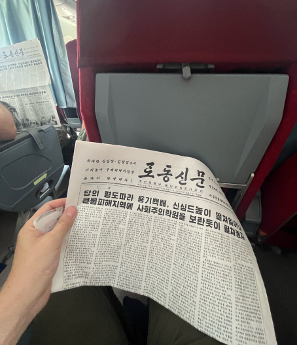
An inspiring patriotic Korean patriotic song was playing in the cabin. I was told that it was about Kim Il Sung because it sounded “abozhi”, which means “father” in Korean. And we know who the father of all Koreans is. Except for the South, of course. It’s fatherless there.
The stewardesses suggested the Nodong Sinmun, the country’s main newspaper. I remember when I surprised my foreign journalism teacher at the institute when I gave him an issue that I had borrowed from my last trip. For him, it was a rarity.
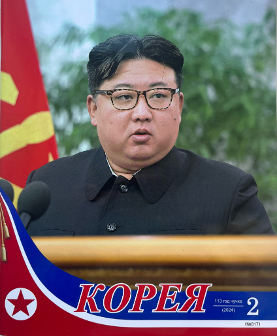
“I bought Korea magazine,” sang Yegor Letov, and I got the magazine for free on the Beijing-Pyongyang plane. This North Korean glossy is incomparably cooler than the American Rolling Stone. February issue, 2024, on the cover – Kim Jong-un in a French coat and leopard-rimmed glasses – North Koreans have their own rock ‘n’ roll, their own idols and their own rock heroes. In general, there are many similarities between the love of the masses for rock idols and North Korean leaders. Only Kim Jong-un has more fans. And fans loyal to him until his death.
Much of the magazine is devoted to the Chairman of State Affairs. Here he is in a frock coat speaking at the X session of the 14th Supreme People’s Assembly of the DPRK – standing behind the rostrum as an organ, controlling the process. And here is another meeting – the speech at the XIX meeting of the Political Bureau of the Central Committee of the Labour Party of Korea 8th convocation is printed. And here is Kim Jong-un with his favourite (another variant – respected) daughter at the Gwangcheon chicken factory. They are walking, inspecting hens and trays with eggs. They’re happy and smiling. And here is Eun in a luxurious leather coat, well, exactly a rock star, ‘managed on the spot the affairs of important military factories’. Which ones are not specified, but maybe in Ukraine we will find out, test the products. And here is Kim Jong-un among the military in caps and scribbled hats supervising the launch of cruise missiles from a submarine. Once again, he’s happy. Everything is awesome.
The remaining pages are devoted to the other Kims, to Il Sung and Jong Il. There is an occasion – the magazine is February, and the Great Leader was born on 16 February 1942 in the mountains of Paektu – never argue with Koreans that he was actually born in the USSR. They, the Koreans, believe me, know better.
When we landed, we saw a hilly green landscape below, and all the squares of fields were combed with beds – the territory of the DPRK is 80% mountainous, and every available plot is cultivated here. The state builds cottages for the villagers – standard houses, cubes of which can be seen from the height of a flying airplane.
To watch our author’s plana landing at the Pyongyang airport, follow the link below:
https://dzen.ru/video/watch/66dc6ccdfe2ded6f9b787461 (Video)
We have landed. The aerodrome is empty, there are still six planes in a row on the right in front of the airport building – not to say that civil aviation is intensively used here. From the airplane we got on a bus with our comrades, which took us to the airport. The bus made two stops – at one entrance we met responsible comrades.
At the entrance there were measures to counteract the covid – our things went through a box that irradiated with ultraviolet light – it was the first time I saw such a camera. Hand luggage, on the other hand, was sprayed.
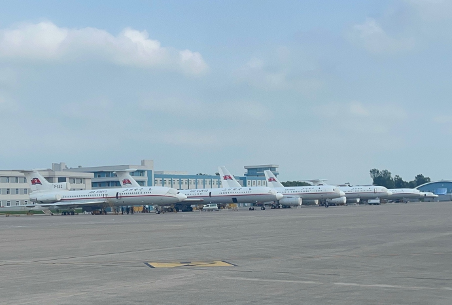
The airport building is not crowded. As you can understand, there are no queues, there is a customs officer and a military officer for each passenger. Moreover, tall Korean women serve on an equal footing with men – totalitarianism nurtures beauty. Border guards were interested in mobile phones, gadgets, laptops and… books – it was the first time I encountered such attention to literature among border guards. In addition to the list of equipment you bring with you, you must also list all the books on the entry form. You can’t bring just any literature into North Korea. I had a book by the Soviet philologist Vygotsky. It was filtered.
The military has wide trousers like sailors. The uniforms look like the old Soviet uniforms, only the caps, like bowls on their heads, are somewhat enlarged compared to ours and look grotesque.
We were met by the host organisation, young comrades. Getting acquainted, talking about the weather – what is there to talk about in a ‘totalitarian’ state. ‘Is it hot in Moscow? It’s hot here.’ It is indeed hot in Pyongyang, but better than in Beijing; in Beijing it is also unbearably hot.
I was born in the USSR; I still remember our Soviet Atlantis and it feels like I’m back in the Soviet Union again. Only now as a foreigner.
While driving, I was looking through the window with great interest at the unfamiliar and marvellous world. A village near the airport – neat streets, houses, lawns. I glimpsed a concrete screen with a poster. Not many people, going about their business. Trees, evenly planted by the roadside, accompanied us all the way to Pyongyang. But there were no lighting poles – due to certain difficulties, electricity is not spent as generously here as in Moscow or Beijing.
The city has begun – new high-rise high-rises have appeared, but you can see that they are not built tastelessly and are not arranged as they are, they create an aesthetic look. Pyongyang is building, growing and expanding. New neighbourhoods, wide avenues, green boulevards. Between the lanes of oncoming traffic there is a strip of shrubbery, flowers and plantings. But the roads are empty, there are few cars, not to say that the traffic here is lively. And the car fleet is not new. People on the streets are dressed modestly, ascetic, but decent and unappealing. No short skirts like Chinese women. Men wear white or blue shirts with short sleeves. There are some military men.
The trip from the airport to downtown Pyongyang, in the video link below:
https://dzen.ru/video/watch/66dc532ac47a955abe0b8346 (Video)
Where have I come to? I have mixed feelings. What’s going on here? What kind of games are being played here? What is this? A decades-long experiment? Building a self-reliant paradise? Cultivating the perfect, sinless, hard-working man as he should be? It’s like you’re in a Zamyatin novel. You’re like Neznaika in a very sunny town.
We were put up in Koryo Hotel on the 21st floor. We were fed – we were served 7(!) different dishes. The rooms are nice and comfortable. The hotel has all facilities for foreigners, everything like in Western countries. There is a sauna, swimming pool, restaurants, 24-hour bars. The Maltese ambassador died in the bar at the entrance downstairs. Malta is one of the first Western countries to establish diplomatic relations with the DPRK. The ambassador had lived in Koryo for a long time, going to the bar and having a drink. One can really live in Koryo for a long time.
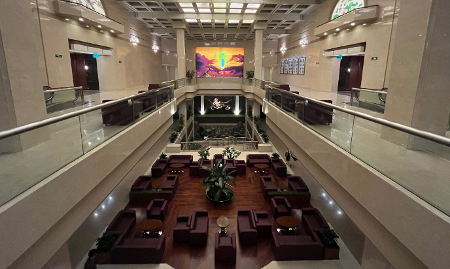
To be continued…
This article was previously published in Russian here. Translation to English by UWI.







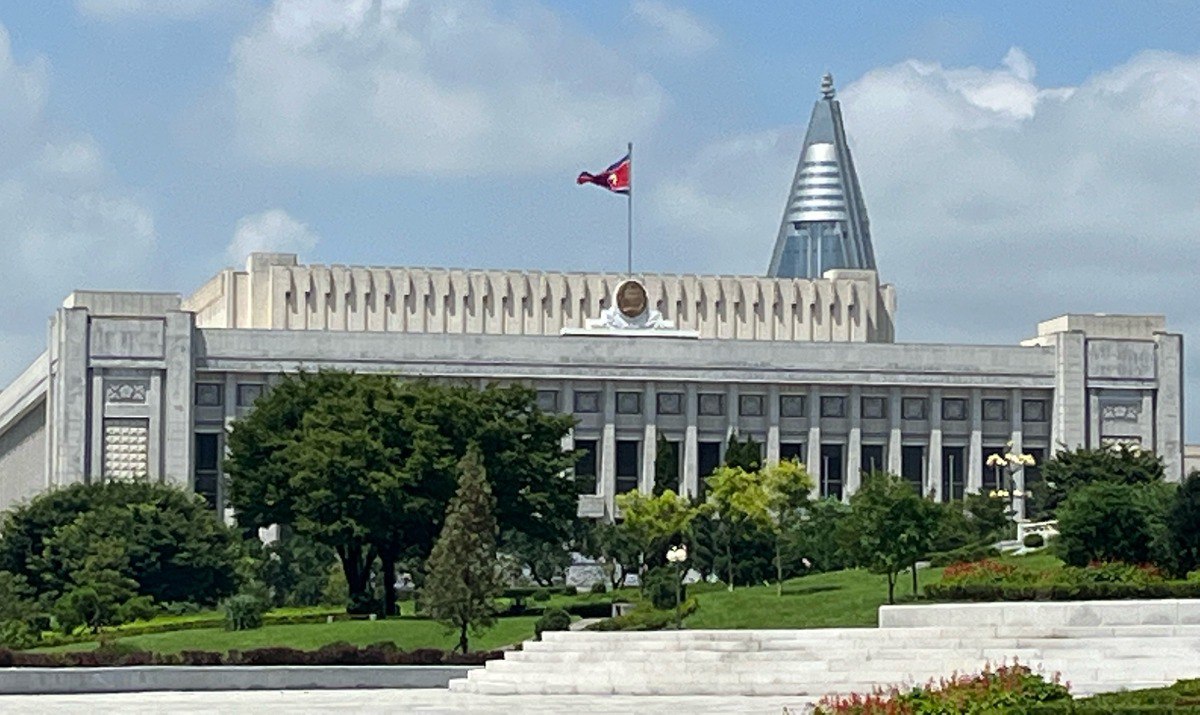









Leave a Reply